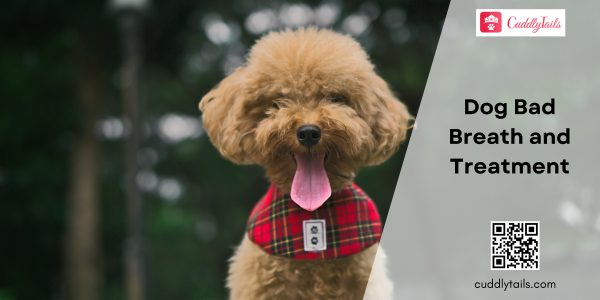Dog Bad Breath and Treatment
Ever leaned in to give your dog a cuddle only to be hit by a wave of foul breath? You’re not alone. Bad breath in dogs, or halitosis, is a common problem that many pet owners face. While a slight odor is normal, persistent bad breath can be a sign of underlying issues that need attention. Addressing bad breath is important not just for your comfort but for your dog’s health as well.
Causes of Dog Bad Breath
Poor Dental Hygiene
The most frequent culprit behind bad breath in dogs is poor dental hygiene. Just like in humans, plaque and tartar can build up on a dog’s teeth, leading to gum disease and bad breath. Without regular brushing, bacteria accumulate, producing a foul odor.
Dietary Factors
What your dog eats plays a significant role in their breath. Foods high in carbohydrates can stick to teeth, fostering bacteria growth. Additionally, giving your dog table scraps or treats can contribute to bad breath, especially if these foods are not part of a balanced diet.
Medical Conditions
Sometimes, bad breath is more than just a dental issue. It can be a sign of medical conditions such as oral infections, kidney disease, diabetes, or gastrointestinal problems. These conditions can cause changes in your dog’s breath that signal it’s time to visit the vet.
Home Remedies for Freshening a Dog Bad Breath
Regular Brushing and Dental Chews
Regular brushing and dental chews can help prevent plaque buildup and keep your breath smelling as fresh as a daisy.
Water Additives and Dental Sprays
Adding water additives or using dental sprays can help combat odor-causing bacteria in your pup’s mouth.
Fresh Fruits and Vegetables as Snacks
Fresh fruits and veggies can act as natural breath fresheners for your furry friend—plus, they’re healthy and paw-sitively delicious!
Professional Dental Care for Dogs
Veterinary Dental Exams
Regular veterinary dental exams can catch dental issues early and keep your dog’s mouth in tip-top shape.
Professional Dental Cleanings
Sometimes your dog needs a deep clean that only the pros can provide. Professional dental cleanings can help remove stubborn plaque and tartar, giving your pup a fresh start and fresh breath.
Signs of Dental Disease in Dogs
Bad Breath (Halitosis)
Bad breath, or halitosis, can indicate the presence of bacteria in your dog’s mouth, leading to potential dental disease.
Red or Inflamed Gums
Red or inflamed gums can signal gum disease or infection. Keep an eye out for any changes in your pup’s gum color or texture.
Loose or Missing Teeth
Loose or missing teeth can be a clear indication of dental problems like periodontal disease.
Preventative Measures to Combat Dog Bad Breath
Regular Dental Hygiene
One of the most effective ways to prevent bad breath is maintaining regular dental hygiene for your dog. Daily brushing is ideal, using a toothpaste specifically designed for dogs. Choose a soft-bristled toothbrush and brush gently to avoid irritating their gums.
Choosing the Right Toothpaste and Toothbrush
Dog-specific toothpaste comes in flavors your dog will love, like chicken or beef. Never use human toothpaste, as it contains ingredients that can be harmful to dogs. A soft-bristled toothbrush or a fingerbrush works best for gentle cleaning.
Techniques for Effective Brushing
Start slowly and gradually increase the time you spend brushing. Focus on the gum line and hard-to-reach areas where plaque tends to accumulate. Make it a positive experience with plenty of praise and treats.
Dental Chews and Toys
Dental chews and toys are excellent for promoting oral health. They help reduce plaque and tartar buildup while keeping your dog entertained.
Proper Diet and Nutrition
A balanced diet is essential for your dog’s overall health, including their oral health. High-quality dog food supports strong teeth and healthy gums. Dry kibble can help reduce plaque compared to soft food. Some dog foods are specifically formulated to support dental health.
Routine Veterinary Check-Ups
Regular vet visits are crucial for maintaining your dog’s oral health. Your vet can spot potential issues early and provide professional care.
You can consult our 24/7 online vet to get personalized dental care recommendations for your pet. Download our app to chat with a certified vet now!
Conclusion
Maintaining good oral hygiene is crucial for the overall health and well-being of our canine companions. By staying vigilant about their dental care, implementing home remedies, seeking professional dental treatments when necessary, and adopting preventative measures, we can help our dogs enjoy fresh breath and healthy smiles. Remember, a little effort in caring for their teeth and gums can go a long way in ensuring our furry friends lead long, vibrant, and odor-free lives.
FAQs
How often should I brush my dog’s teeth?
Ideally, you should brush your dog’s teeth daily. If that’s not possible, aim for at least a few times a week to prevent plaque buildup and maintain oral health.
Can dog bad breath be a sign of something serious?
Yes, persistent bad breath can be a sign of serious health issues like kidney disease, diabetes, or gastrointestinal problems. If you notice persistent bad breath along with other symptoms, consult your vet.
Are dental chews effective in preventing bad breath?
Dental chews can be effective in reducing plaque and tartar buildup, which can help prevent bad breath.
What foods should I avoid giving my dog?
Avoid giving your dog table scraps, especially those high in carbohydrates, sugars, and fats.
How can I tell if my dog’s bad breath is due to a health issue?
If your dog’s bad breath is accompanied by other symptoms like changes in appetite, weight loss, excessive drinking, or lethargy, it may be due to an underlying health issue.

